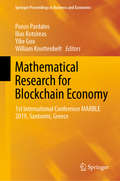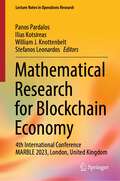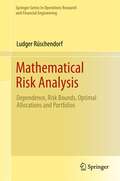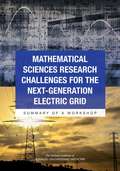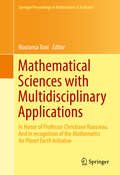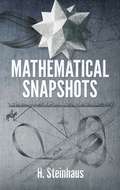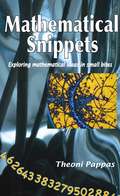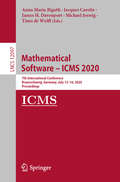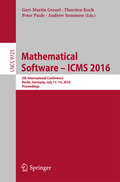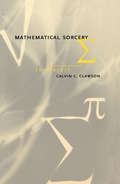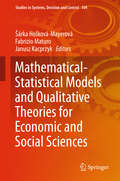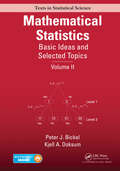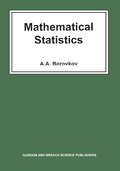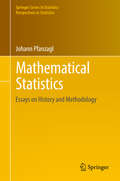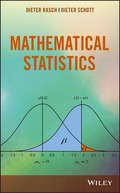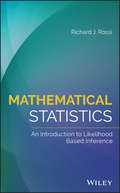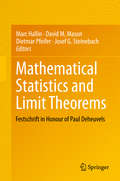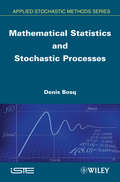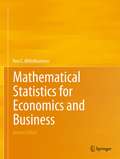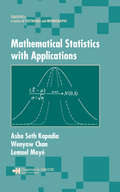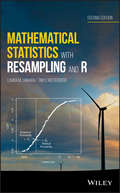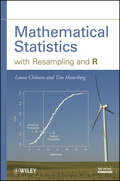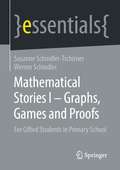- Table View
- List View
Mathematical Research for Blockchain Economy: 1st International Conference MARBLE 2019, Santorini, Greece (Springer Proceedings in Business and Economics)
by Panos Pardalos Ilias Kotsireas William Knottenbelt Yike GuoThis book presents the best papers from the 1st International Conference on Mathematical Research for Blockchain Economy (MARBLE) 2019, held in Santorini, Greece. While most blockchain conferences and forums are dedicated to business applications, product development or Initial Coin Offering (ICO) launches, this conference focused on the mathematics behind blockchain to bridge the gap between practice and theory. Every year, thousands of blockchain projects are launched and circulated in the market, and there is a tremendous wealth of blockchain applications, from finance to healthcare, education, media, logistics and more. However, due to theoretical and technical barriers, most of these applications are impractical for use in a real-world business context. The papers in this book reveal the challenges and limitations, such as scalability, latency, privacy and security, and showcase solutions and developments to overcome them.
Mathematical Research for Blockchain Economy: 4th International Conference MARBLE 2023, London, United Kingdom (Lecture Notes in Operations Research)
by Panos Pardalos Ilias Kotsireas William J. Knottenbelt Stefanos LeonardosThis book presents the best papers from the 4th International Conference on Mathematical Research for Blockchain Economy (MARBLE) 2023, held in London, UK. While most blockchain conferences and forums are dedicated to business applications, product development, or Initial Coin Offering (ICO) launches, this conference focused on the mathematics behind blockchain to bridge the gap between practice and theory. The book spans the divide between theoretical promise and practical reality in blockchain technology and explores the challenges hindering its real-world integration across diverse sectors, offering comprehensive insights into issues like scalability, security, and privacy.
Mathematical Risk Analysis
by Ludger RüschendorfThe author's particular interest in the area of risk measures is to combine this theory with the analysis of dependence properties. The present volume gives an introduction of basic concepts and methods in mathematical risk analysis, in particular of those parts of risk theory that are of special relevance to finance and insurance. Describing the influence of dependence in multivariate stochastic models on risk vectors is the main focus of the text that presents main ideas and methods as well as their relevance to practical applications. The first part introduces basic probabilistic tools and methods of distributional analysis, and describes their use to the modeling of dependence and to the derivation of risk bounds in these models. In the second, part risk measures with a particular focus on those in the financial and insurance context are presented. The final parts are then devoted to applications relevant to optimal risk allocation, optimal portfolio problems as well as to the optimization of insurance contracts. Good knowledge of basic probability and statistics as well as of basic general mathematics is a prerequisite for comfortably reading and working with the present volume, which is intended for graduate students, practitioners and researchers and can serve as a reference resource for the main concepts and techniques.
The Mathematical Sciences in 2025
by Committee on the Mathematical Sciences in 2025The mathematical sciences are part of nearly all aspects of everyday life--the discipline has underpinned such beneficial modern capabilities as Internet search, medical imaging, computer animation, numerical weather predictions, and all types of digital communications. The Mathematical Sciences in 2025 examines the current state of the mathematical sciences and explores the changes needed for the discipline to be in a strong position and able to maximize its contribution to the nation in 2025. It finds the vitality of the discipline excellent and that it contributes in expanding ways to most areas of science and engineering, as well as to the nation as a whole, and recommends that training for future generations of mathematical scientists should be re-assessed in light of the increasingly cross-disciplinary nature of the mathematical sciences. In addition, because of the valuable interplay between ideas and people from all parts of the mathematical sciences, the report emphasizes that universities and the government need to continue to invest in the full spectrum of the mathematical sciences in order for the whole enterprise to continue to flourish long-term.
Mathematical Sciences Research Challenges for the Next-Generation Electric Grid: Summary of a Workshop
by Michelle SchwalbeIf the United States is to sustain its economic prosperity, quality of life, and global competitiveness, it must continue to have an abundance of secure, reliable, and affordable energy resources. There have been many improvements in the technology and capability of the electric grid over the past several decades. Many of these advances to the grid depend on complex mathematical algorithms and techniques, and as the complexity of the grid has increased, the analytical demands have also increased. The workshop summarized in this report was developed as part of an ongoing study of the Committee on Analytical Research Foundations for the Next-Generation Electric Grid. Mathematical Sciences Research Challenges for the Next-Generation Electric Grid summarizes the presentations and discussions from this workshop. This report identifies critical areas of mathematical and computational research that must be addressed for the next-generation electric transmission and distribution system and to identify future needs and ways that current research efforts in these areas could be adjusted or augmented.
Mathematical Sciences with Multidisciplinary Applications
by Bourama ToniThis book is the fourth in a multidisciplinary series which brings together leading researchers in the STEAM-H disciplines (Science, Technology, Engineering, Agriculture, Mathematics and Health) to present their perspective on advances in their own specific fields, and to generate a genuinely interdisciplinary collaboration that transcends parochial subject-matter boundaries. All contributions are carefully edited, peer-reviewed, reasonably self-contained, and pedagogically crafted for a multidisciplinary readership. Contributions are drawn from a variety of fields including mathematics, statistics, game theory and behavioral sciences, biomathematics and physical chemistry, computer science and human-centered computing. This volume is dedicated to Professor Christiane Rousseau, whose work inspires the STEAM-H series, in recognition of her passion for the mathematical sciences and her on-going initiative, the Mathematics of Planet Earth paradigm of interdisciplinarity. The volume's primary goal is to enhance interdisciplinary understanding between these areas of research by showing how new advances in a particular field can be relevant to open problems in another and how many disciplines contribute to a better understanding of relevant issues at the interface of mathematics and the sciences. The main emphasis is on important methods, research directions and applications of analysis within and beyond each field. As such, the volume aims to foster student interest and participation in the STEAM-H domain, as well as promote interdisciplinary research collaborations. The volume is valuable as a reference of choice and a source of inspiration for a broad spectrum of scientists, mathematicians, research students and postdoctoral fellows.
Mathematical Snapshots
by H. SteinhausNumerous photographs and diagrams help explain and illustrate mathematical phenomena in this series of thought-provoking expositions. Ranging from simple puzzles and games to more advanced problems, topics include the psychology of lottery players, the arrangement of chromosomes in a human cell, new and larger prime numbers, the fair division of a cake, how to find the shortest possible way to link a dozen locations by rail, and many other absorbing conundrums. A fascinating glimpse into the world of numbers and their uses. 1969 edition. 391 black-and-white illustrations.
Mathematical Snippets
by Theoni PappasFrom nutritional labels and box office statistics to terabytes and megapixels, the 21st century world is awash in numbers. How can the average Joe or Jane make sense of all that data? The key, Theoni Pappas argues, is math. In Mathematical Snippets, she draws readers into the fascinating world of math without overwhelming them with mind-numbing equations. Short, engaging sections on everything from golf to game theory introduce mathematical concepts and celebrate math's impact on daily life.
Mathematical Software – ICMS 2020: 7th International Conference, Braunschweig, Germany, July 13–16, 2020, Proceedings (Lecture Notes in Computer Science #12097)
by Anna Maria Bigatti Jacques Carette James H. Davenport Michael Joswig Timo De WolffThis book constitutes the proceedings of the 7th International Conference on Mathematical Software, ICMS 2020, held in Braunschweig, Germany, in July 2020. The 48 papers included in this volume were carefully reviewed and selected from 58 submissions. The program of the 2020 meeting consisted of 20 topical sessions, each of which providing an overview of the challenges, achievements and progress in a environment of mathematical software research, development and use.
Mathematical Software - ICMS 2016
by Gert-Martin Greuel Thorsten Koch Peter Paule Andrew SommeseThis book constitutes the proceedings of the 5th International Conference on Mathematical Software, ICMS 2015, held in Berlin, Germany, in July 2016. The 68 papers included in this volume were carefully reviewed and selected from numerous submissions. The papers are organized in topical sections named: univalent foundations and proof assistants; software for mathematical reasoning and applications; algebraic and toric geometry; algebraic geometry in applications; software of polynomial systems; software for numerically solving polynomial systems; high-precision arithmetic, effective analysis, and special functions; mathematical optimization; interactive operation to scientific artwork and mathematical reasoning; information services for mathematics: software, services, models, and data; semDML: towards a semantic layer of a world digital mathematical library; miscellanea.
Mathematical Sorcery: Revealing the Secrets of Numbers
by Calvin C. ClawsonThe secret of constellations, the enigma of the golden mean, and the brilliance of a proof-these are just some of the wonders Clawson explores with unbridled delight in this recreational math book. Throughout the book he divulges the wisdom of the ancient Greeks, Sumerians, Babylonians, and Egyptians, whose stunning revelations still have deep meaning today. Transporting us beyond mere appreciation, Clawson urges us to tackle functions, tangents, and the concept of infinity. He helps us intuitively comprehend these and other building blocks of mathematics through explaining their discovery and uses. By accompanying him on his journey, we taste the fruit of knowledge that has eluded us until now.
Mathematical-Statistical Models and Qualitative Theories for Economic and Social Sciences
by Janusz Kacprzyk Fabrizio Maturo Šárka Hošková-MayerováThis book presents a broad spectrum of problems related to statistics, mathematics, teaching, social science, and economics as well as a range of tools and techniques that can be used to solve these problems. It is the result of a scientific collaboration between experts in the field of economic and social systems from the University of Defence in Brno (Czech Republic), G. d'Annunzio University of Chieti-Pescara (Italy), Pablo de Olavid eUniversity of Sevilla (Spain), and Ovidius University in Constanţa, (Romania). The studies included were selected using a peer-review process and reflect heterogeneity and complexity of economic and social phenomena. They and present interesting empirical research from around the globe and from several research fields, such as statistics, decision making, mathematics, complexity, psychology, sociology and economics. The volume is divided into two parts. The first part, "Recent trends in mathematical and statistical models for economic and social sciences", collects papers on quantitative matters, which propose mathematical and statistical models for social sciences, economics, finance, and business administration. The second part, "Recent trends in qualitative theories for economic and social sciences", includes papers on qualitative matters, which discuss social, economic, and teaching issues. It is an ideal reference work for all those researchers interested in recent quantitative and qualitative tools. Covering a wide range of topics, it appeals in equal measure to mathematicians, statisticians, sociologists, philosophers, and specialists in the fields of communication, social and political sciences.
Mathematical Statistics: Basic Ideas and Selected Topics, Volume II (Chapman And Hall/crc Texts In Statistical Science Ser. #119)
by Peter J. Bickel Kjell A. DoksumMathematical Statistics: Basic Ideas and Selected Topics, Volume II presents important statistical concepts, methods, and tools not covered in the authors' previous volume. This second volume focuses on inference in non- and semiparametric models. It not only reexamines the procedures introduced in the first volume from a more sophisticated point o
Mathematical Statistics (Selected Translations On Mathematical Statistics And Probability Ser. #Vol. 2)
by A A BorokovA wide-ranging, extensive overview of modern mathematical statistics, this work reflects the current state of the field while being succinct and easy to grasp. The mathematical presentation is coherent and rigorous throughout. The author presents classical results and methods that form the basis of modern statistics, and examines the foundations o
Mathematical Statistics
by Johann PfanzaglIn the middle of the last century the development of mathematical statistics underwent an enduring change, due to the use of more refined mathematical tools. New concepts like sufficiency, superefficiency, adaptivity etc. motivated scholars to reflect upon the interpretation of mathematical concepts in terms of their real-world relevance. Questions concerning the optimality of estimators, for instance, had remained unanswered for decades, as a meaningful concept of optimality (based on regularity of the estimators, the representation of their limit distribution and assertions about their concentration by means of Anderson's Theorem) was not yet available. The rapidly developing asymptotic theory provided approximate answers to questions for which non-asymptotic theory had found no satisfying solutions. In four engaging essays, Pfanzagl's book presents a detailed description of how the use of mathematical methods stimulated the development of a statistical theory. A book on the history of mathematical statistics would offer a description of who did what and when. Pfanzagl's book, centred on questions of methodology, points to missed opportunities, questionable proofs, neglected questions of priority, and to the presence of such deficiencies even in recent textbooks.
Mathematical Statistics
by Dieter Rasch Dieter SchottExplores mathematical statistics in its entirety—from the fundamentals to modern methods This book introduces readers to point estimation, confidence intervals, and statistical tests. Based on the general theory of linear models, it provides an in-depth overview of the following: analysis of variance (ANOVA) for models with fixed, random, and mixed effects; regression analysis is also first presented for linear models with fixed, random, and mixed effects before being expanded to nonlinear models; statistical multi-decision problems like statistical selection procedures (Bechhofer and Gupta) and sequential tests; and design of experiments from a mathematical-statistical point of view. Most analysis methods have been supplemented by formulae for minimal sample sizes. The chapters also contain exercises with hints for solutions. Translated from the successful German text, Mathematical Statistics requires knowledge of probability theory (combinatorics, probability distributions, functions and sequences of random variables), which is typically taught in the earlier semesters of scientific and mathematical study courses. It teaches readers all about statistical analysis and covers the design of experiments. The book also describes optimal allocation in the chapters on regression analysis. Additionally, it features a chapter devoted solely to experimental designs. Classroom-tested with exercises included Practice-oriented (taken from day-to-day statistical work of the authors) Includes further studies including design of experiments and sample sizing Presents and uses IBM SPSS Statistics 24 for practical calculations of data Mathematical Statistics is a recommended text for advanced students and practitioners of math, probability, and statistics.
Mathematical Statistics: An Introduction to Likelihood Based Inference
by Richard J. RossiPresents a unified approach to parametric estimation, confidence intervals, hypothesis testing, and statistical modeling, which are uniquely based on the likelihood function This book addresses mathematical statistics for upper-undergraduates and first year graduate students, tying chapters on estimation, confidence intervals, hypothesis testing, and statistical models together to present a unifying focus on the likelihood function. It also emphasizes the important ideas in statistical modeling, such as sufficiency, exponential family distributions, and large sample properties. Mathematical Statistics: An Introduction to Likelihood Based Inference makes advanced topics accessible and understandable and covers many topics in more depth than typical mathematical statistics textbooks. It includes numerous examples, case studies, a large number of exercises ranging from drill and skill to extremely difficult problems, and many of the important theorems of mathematical statistics along with their proofs. In addition to the connected chapters mentioned above, Mathematical Statistics covers likelihood-based estimation, with emphasis on multidimensional parameter spaces and range dependent support. It also includes a chapter on confidence intervals, which contains examples of exact confidence intervals along with the standard large sample confidence intervals based on the MLE's and bootstrap confidence intervals. There’s also a chapter on parametric statistical models featuring sections on non-iid observations, linear regression, logistic regression, Poisson regression, and linear models. Prepares students with the tools needed to be successful in their future work in statistics data science Includes practical case studies including real-life data collected from Yellowstone National Park, the Donner party, and the Titanic voyage Emphasizes the important ideas to statistical modeling, such as sufficiency, exponential family distributions, and large sample properties Includes sections on Bayesian estimation and credible intervals Features examples, problems, and solutions Mathematical Statistics: An Introduction to Likelihood Based Inference is an ideal textbook for upper-undergraduate and graduate courses in probability, mathematical statistics, and/or statistical inference.
Mathematical Statistics and Limit Theorems
by Marc Hallin David M. Mason Dietmar Pfeifer Josef G. SteinebachThis Festschrift in honour of Paul Deheuvels' 65th birthday compiles recent research results in the area between mathematical statistics and probability theory with a special emphasis on limit theorems. The book brings together contributions from invited international experts to provide an up-to-date survey of the field. Written in textbook style, this collection of original material addresses researchers, PhD and advanced Master students with a solid grasp of mathematical statistics and probability theory.
Mathematical Statistics and Stochastic Processes
by Denis BosqGenerally, books on mathematical statistics are restricted to the case of independent identically distributed random variables. In this book however, both this case AND the case of dependent variables, i.e. statistics for discrete and continuous time processes, are studied. This second case is very important for today’s practitioners. Mathematical Statistics and Stochastic Processes is based on decision theory and asymptotic statistics and contains up-to-date information on the relevant topics of theory of probability, estimation, confidence intervals, non-parametric statistics and robustness, second-order processes in discrete and continuous time and diffusion processes, statistics for discrete and continuous time processes, statistical prediction, and complements in probability. This book is aimed at students studying courses on probability with an emphasis on measure theory and for all practitioners who apply and use statistics and probability on a daily basis.
Mathematical Statistics for Economics and Business
by Ron C. MittelhammerMathematical Statistics for Economics and Business, Second Edition, provides a comprehensive introduction to the principles of mathematical statistics which underpin statistical analyses in the fields of economics, business, and econometrics. The selection of topics in this textbook is designed to provide students with a conceptual foundation that will facilitate a substantial understanding of statistical applications in these subjects. This new edition has been updated throughout and now also includes a downloadable Student Answer Manual containing detailed solutions to half of the over 300 end-of-chapter problems. After introducing the concepts of probability, random variables, and probability density functions, the author develops the key concepts of mathematical statistics, most notably: expectation, sampling, asymptotics, and the main families of distributions. The latter half of the book is then devoted to the theories of estimation and hypothesis testing with associated examples and problems that indicate their wide applicability in economics and business. Features of the new edition include: a reorganization of topic flow and presentation to facilitate reading and understanding; inclusion of additional topics of relevance to statistics and econometric applications; a more streamlined and simple-to-understand notation for multiple integration and multiple summation over general sets or vector arguments; updated examples; new end-of-chapter problems; a solution manual for students; a comprehensive answer manual for instructors; and a theorem and definition map. This book has evolved from numerous graduate courses in mathematical statistics and econometrics taught by the author, and will be ideal for students beginning graduate study as well as for advanced undergraduates.
Mathematical Statistics With Applications (Statistics: Textbooks and Monographs #179)
by Asha Seth Kapadia Wenyaw Chan Lemuel A. Moyé<p>Mathematical statistics typically represents one of the most difficult challenges in statistics, particularly for those with more applied, rather than mathematical, interests and backgrounds. Most textbooks on the subject provide little or no review of the advanced calculus topics upon which much of mathematical statistics relies and furthermore contain material that is wholly theoretical, thus presenting even greater challenges to those interested in applying advanced statistics to a specific area. <p>Mathematical Statistics with Applications presents the background concepts and builds the technical sophistication needed to move on to more advanced studies in multivariate analysis, decision theory, stochastic processes, or computational statistics. Applications embedded within theoretical discussions clearly demonstrate the utility of the theory in a useful and relevant field of application and allow readers to avoid sudden exposure to purely theoretical materials.With its clear explanations and more than usual emphasis on applications and computation, this text reaches out to the many students and professionals more interested in the practical use of statistics to enrich their work in areas such as communications, computer science, economics, astronomy, and public health.</p>
Mathematical Statistics with Applications
by Dennis D. Wackerly William Mendenhall III Richard L. ScheafferIn their bestselling title MATHEMATICAL STATISTICS WITH APPLICATIONS, premiere authors Dennis Wackerly, William Mendenhall, and Richard L. Scheaffer present a solid foundation in statistical theory while conveying the relevance and importance of the theory in solving practical problems in the real world. The authors' use of practical applications and excellent exercises helps you discover the nature of statistics and understand its essential role in scientific research. With the addition of contributor Brendan Ames, MATHEMATICAL STATISTICS WITH APPLICATIONS now includes an enhanced eTextbook. Simulation activities using interactive applets and R embedded within the MindTap Reader help students visualize statistical concepts, and an appendix introducing students to statistical data analysis using R can be found at the end of the eTextbook.
Mathematical Statistics with Resampling and R: With Applications And R Set
by Laura M. Chihara Tim C. HesterbergThis thoroughly updated second edition combines the latest software applications with the benefits of modern resampling techniques Resampling helps students understand the meaning of sampling distributions, sampling variability, P-values, hypothesis tests, and confidence intervals. The second edition of Mathematical Statistics with Resampling and R combines modern resampling techniques and mathematical statistics. This book has been classroom-tested to ensure an accessible presentation, uses the powerful and flexible computer language R for data analysis and explores the benefits of modern resampling techniques. This book offers an introduction to permutation tests and bootstrap methods that can serve to motivate classical inference methods. The book strikes a balance between theory, computing, and applications, and the new edition explores additional topics including consulting, paired t test, ANOVA and Google Interview Questions. Throughout the book, new and updated case studies are included representing a diverse range of subjects such as flight delays, birth weights of babies, and telephone company repair times. These illustrate the relevance of the real-world applications of the material. This new edition: • Puts the focus on statistical consulting that emphasizes giving a client an understanding of data and goes beyond typical expectations • Presents new material on topics such as the paired t test, Fisher's Exact Test and the EM algorithm • Offers a new section on "Google Interview Questions" that illustrates statistical thinking • Provides a new chapter on ANOVA • Contains more exercises and updated case studies, data sets, and R code Written for undergraduate students in a mathematical statistics course as well as practitioners and researchers, the second edition of Mathematical Statistics with Resampling and R presents a revised and updated guide for applying the most current resampling techniques to mathematical statistics.
Mathematical Statistics with Resampling and R
by Laura M. Chihara Tim C. HesterbergThis book bridges the latest software applications with the benefits of modern resampling techniquesResampling helps students understand the meaning of sampling distributions, sampling variability, P-values, hypothesis tests, and confidence intervals. This groundbreaking book shows how to apply modern resampling techniques to mathematical statistics. Extensively class-tested to ensure an accessible presentation, Mathematical Statistics with Resampling and R utilizes the powerful and flexible computer language R to underscore the significance and benefits of modern resampling techniques.The book begins by introducing permutation tests and bootstrap methods, motivating classical inference methods. Striking a balance between theory, computing, and applications, the authors explore additional topics such as:Exploratory data analysisCalculation of sampling distributionsThe Central Limit TheoremMonte Carlo samplingMaximum likelihood estimation and properties of estimatorsConfidence intervals and hypothesis testsRegressionBayesian methodsThroughout the book, case studies on diverse subjects such as flight delays, birth weights of babies, and telephone company repair times illustrate the relevance of the real-world applications of the discussed material. Key definitions and theorems of important probability distributions are collected at the end of the book, and a related website is also available, featuring additional material including data sets, R scripts, and helpful teaching hints.Mathematical Statistics with Resampling and R is an excellent book for courses on mathematical statistics at the upper-undergraduate and graduate levels. It also serves as a valuable reference for applied statisticians working in the areas of business, economics, biostatistics, and public health who utilize resampling methods in their everyday work.
Mathematical Stories I – Graphs, Games and Proofs: For Gifted Students in Primary School (essentials)
by Susanne Schindler-Tschirner Werner SchindlerWith the help of tried and tested, carefully elaborated learning units, the authors convey fundamental mathematical techniques in this essential, which are important far beyond primary school. In the present volume I, path problems and word puzzles are modeled and solved using undirected and directed graphs. Simple math games are systematically analyzed and the optimal strategies are determined. Students learn to gradually reduce difficult problems to simpler ones and to provide evidence in different contexts. The tasks encourage mathematical thinking, imagination and creativity. The detailed sample solutions are designed for non-mathematicians. This book is a translation of the original German 1st edition Mathematische Geschichten I – Graphen, Spiele und Beweise by Susanne Schindler-Tschirner and Werner Schindler, published by Springer Fachmedien Wiesbaden GmbH, part of Springer Nature in 2019. The translation was done with the help of artificial intelligence (machine translation by the service DeepL.com). A subsequent human revision was done primarily in terms of content, so that the book will read stylistically differently from a conventional translation. Springer Nature works continuously to further the development of tools for the production of books and on the related technologies to support the authors.
